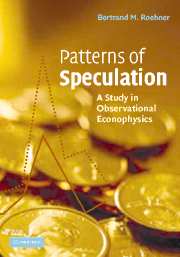4 - ORGANIZATION OF SPECULATIVE MARKETS
Published online by Cambridge University Press: 02 December 2009
Summary
François Castanier, a French ship-owner from the southern city of Montpellier was one of the six directors of the “Compagnie d'Occident,” the company initiated by John Law. At the beginning of 1719 he wrote numerous letters to several middlemen in order to convert his shares in the company into land and estates. On September 18, 1719 he noted in his diary that, due to the speculation set into motion by Law's companies, he had few competitors for his purchases of land. F. Castanier thus provides an early example of those cautious investors who are able to withdraw from speculative operations in good conditions. Castanier's biography (Chaussinand-Nogaret 1970) contains several other elements which are of interest for the reader of the twenty-first century. At one point we are told that the nephew of one of his colleagues, Marquet de Bourgade, had spent several months in Amsterdam, where he familiarized himself with the so-called privilege contracts. Through such a contract one party acquired the right, butwas not thereby obligated, to buy from (or sell to) the other party a given amount of a commodity at a certain price. In other words privilege contracts were what we today refer to as call (or put) options.
From these observations it can be seen that the behavior of investors as well as their financial techniques were not altogether different fromthose in use three centuries later. This will be one of the main themes in this and the next chapter. In pursuing this historical review we will try to discover some basic principles which guide the development of speculative markets.
- Type
- Chapter
- Information
- Patterns of SpeculationA Study in Observational Econophysics, pp. 55 - 80Publisher: Cambridge University PressPrint publication year: 2002



